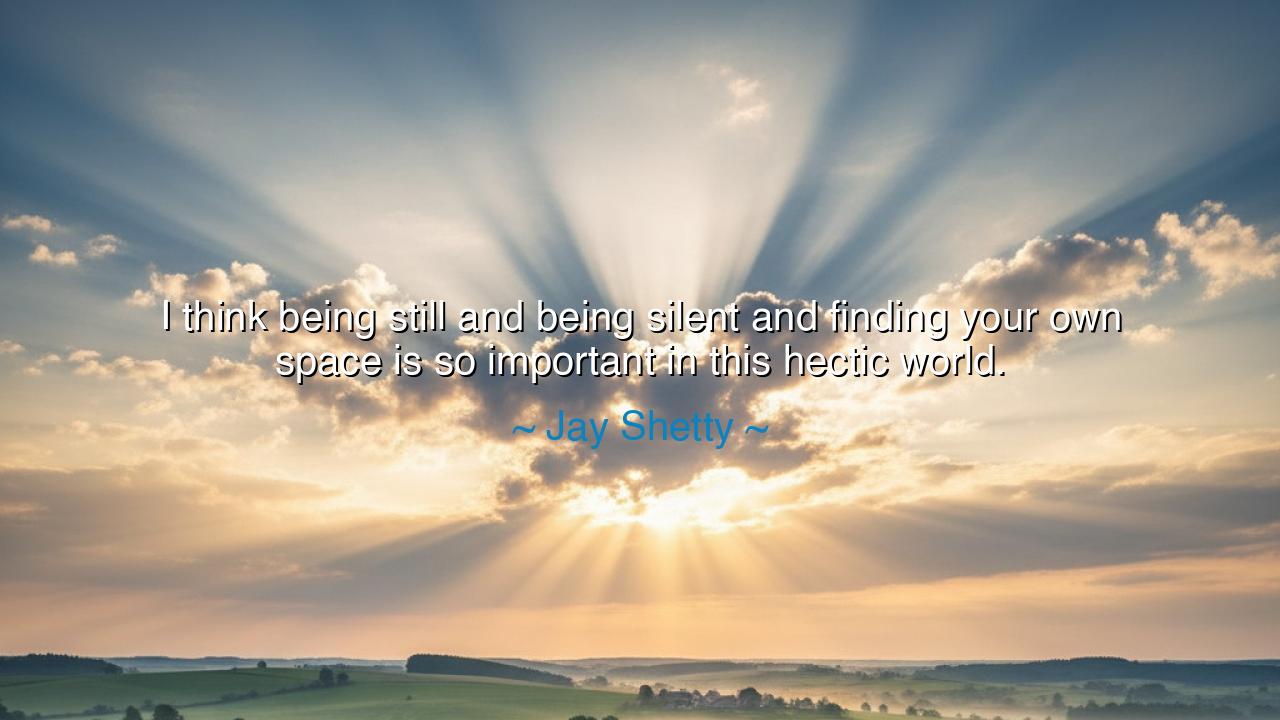
I think being still and being silent and finding your own space
I think being still and being silent and finding your own space is so important in this hectic world.






In a world that is constantly in motion, where the clamor of daily life surrounds us with noise and distraction, there is a truth that has been echoed through the ages: the power of stillness and silence. Jay Shetty wisely observes, "I think being still and being silent and finding your own space is so important in this hectic world." These words remind us of the need to withdraw from the noise, to find that sacred space within ourselves where the world’s demands cannot reach us. In this silence, we find clarity; in this stillness, we find peace. The ancient wisdom of solitude and reflection is not just a lesson from the past—it is a living truth, ever relevant, ever essential for the soul's balance.
The ancients knew well the value of stillness. Socrates, the great philosopher, famously spent long hours in quiet contemplation, listening not to the chatter of the world, but to the quiet voice within. He believed that the true path to wisdom lay in knowing oneself, a task impossible without moments of reflection away from the noise of society. Similarly, Buddha sought enlightenment not through the tumult of the world, but through deep meditation, seeking the inner space where true peace resides. Stillness, for the ancients, was not a retreat from the world but a necessary practice to center the self and discover the deeper truths that guide one through life.
In this modern age, where the world spins ever faster, we often forget the ancient wisdom that teaches us to step back and embrace moments of silence. Consider the chaos that surrounds us today: endless notifications, constant chatter, the pressure to keep moving, to keep achieving. It is easy to feel that we must always be doing, always in motion, to prove our worth. Yet, in the rush to keep up with the world, we lose something profoundly important—the ability to just be. Jay Shetty’s words challenge us to reclaim this stillness, to carve out moments of peace where we can reconnect with our true selves, away from the chaos that threatens to swallow us whole.
The story of Hercules and his twelve labors speaks to this lesson as well. Hercules was tasked with completing impossible tasks, often facing overwhelming odds. Yet, even in the midst of his heroic battles and trials, there were moments when he needed to pause, to take a breath, to gather his strength and find the clarity to continue. His great strength came not just from his physical power, but from his ability to find moments of solitude to center his mind and reflect on his next move. Stillness, though often misunderstood as weakness, is in fact the key to true strength. The great warriors, philosophers, and thinkers of the past knew that only by mastering the inner world could they face the storms of the outer world.
Consider also the example of Laozi, the ancient Chinese sage, who taught that to go with the flow of life, one must first cultivate stillness. In his Tao Te Ching, he writes, "A journey of a thousand miles begins with a single step," and this step must be made in stillness of heart. Laozi teaches us that action is most powerful when it arises from a place of peace. By embracing stillness, we align ourselves with the natural rhythms of the universe, acting not from a place of force, but from a place of wisdom and grace. In this quiet alignment, we discover that the world does not need us to rush, but to listen and respond with clarity and purpose.
The lesson is clear: in the clamor of our modern existence, we must not lose sight of the power of stillness. Shetty’s words speak to the heart of what it means to truly live—not to be constantly in motion, but to take the time to find our center amidst the storms. In this stillness, we allow our minds to become clear, our emotions to settle, and our spirits to reconnect with the higher truths of life. It is in these quiet moments that we find the strength to move forward, not from a place of exhaustion and distraction, but from a place of deep understanding and peace.
In our own lives, we must embrace the practice of finding space—a time each day to step away from the noise, to sit in silence, to reflect and center ourselves. This practice does not require us to retreat from the world, but to engage with it from a place of stillness, knowing that our true strength lies in our ability to listen deeply, both to ourselves and the world around us. Let us take this wisdom of the ancients and of Shetty to heart, and in doing so, we will find that the most powerful actions are those that arise from the quiet moments of stillness, not from the constant whirl of the world’s demands.






AAdministratorAdministrator
Welcome, honored guests. Please leave a comment, we will respond soon